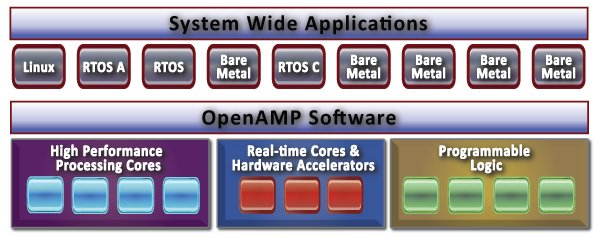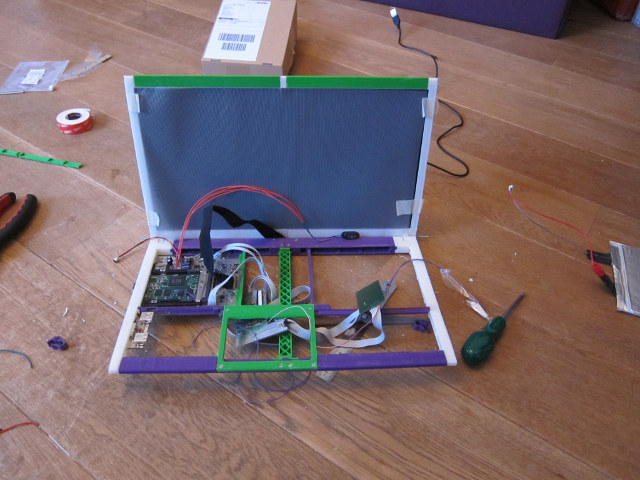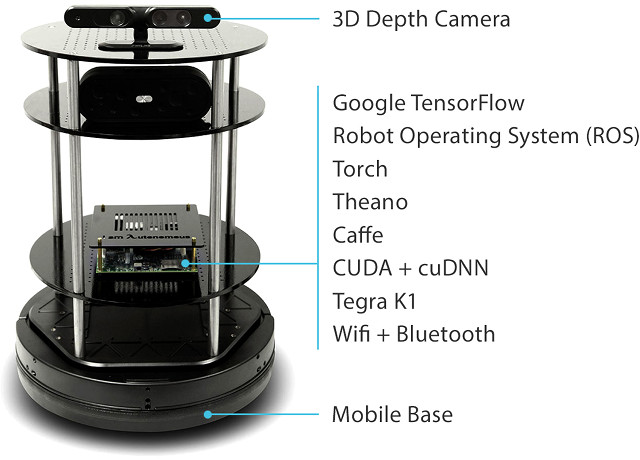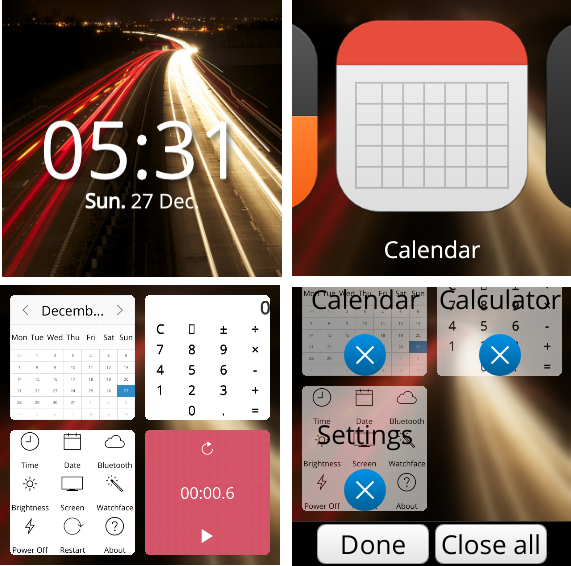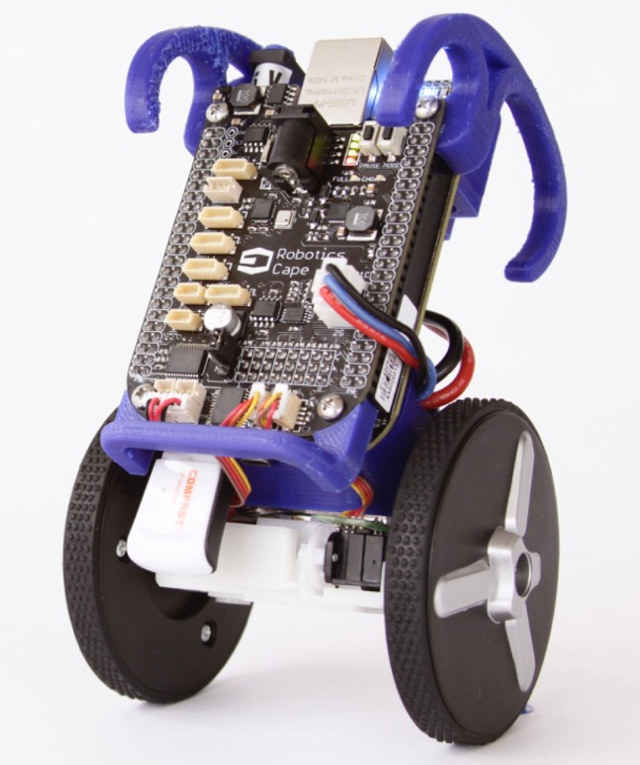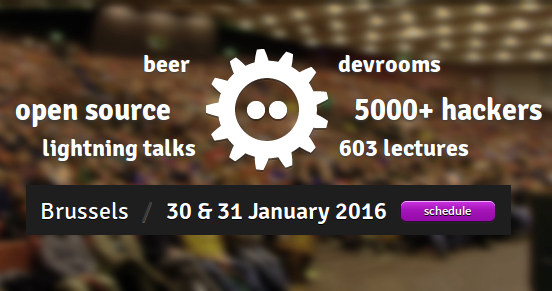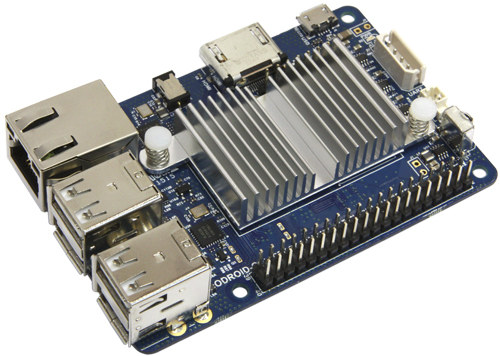SoCs becoming more complex, and go beyond homogeneous multicore systems by mixing different type of cores such as high performance cores, low power real-time cores, or even FPGA fabric. Examples include NXP i.MX6 SoloX with an ARM Cortex A9 core for Linux apps, and an ARM Cortex M4 core for real-time tasks, or Xilinx Zynq UltraScale+ MPSoC with Cortex A53 core for higher level apps, Cortex R5 cores for real-time processing, and Ultrascale FPGA logic. All these different cores are running their own Linux based OS, real-time operating system or bare metal application, and all this makes software development an even greater difficult tasks. In order to reduce the complexity, and address some of the issues, the Multicore Association has launched a new working group targeting the management, expansion, and standardization of OpenAMP (Open Asymmetric Multi Processing), an open source framework that allows operating systems to interact within a broad […]
Rhombus Tech 15.6″ Libre Laptop is User-Upgradeable with EOMA68 CPU Cards
When the first Raspberry Pi model launched, there was just not enough boards to fill the demand, and as people kept waiting they were also investigating alternatives, and a growing community worked on Allwinner based platforms. At the time (2012), the main hardware project was EOMA68 CPU card using a PCMCIA connector, with ended up inside Improv development board, and aimed at providing user replaceable and upgradeable CPU cards. Sadly the initiative got some issues, and things did not quite work out as expected, but the person who launched the whole project, Luke Kenneth Casson Leighton (LKCL), did not give up on the idea, and has kept on working on EOMA68 standard with CPU cards from Allwinner and other SoC vendors. Recently, he’s been working on a Libre Laptop based on an Allwinner A20 EOMA68 CPU module, and will showcase the prototype at FOSDEM 2016 in Brussels this coming week-end. […]
Autonomous Deep Learning Robot Features Nvidia Jetson TK1 Board, a 3D Camera, and More
Autonomous, a US company that makes smart products such as smart desks, virtual reality kits and autonomous robots, has recently introduced a deep learning robot that comes with a 3D camera, speaker and microphone, Jetson TK1 board, and a mobile base. The robot appears to be mostly made of the shelves parts: 3D Depth camera – Asus Xtion Pro 3D Depth Camera Speaker & Microphone Nvidia Jetson TK1 PM375 board – Nvidia Terra K1 quad-core Cortex A15 processor @ 2.3 GHz with a 192-core Kepler GPU, 2GB RAM, 16 GB flash Kobuki Mobile Base – Kobuki is the best mobile base designed for education and research on state of the art robotics. Kobuki provides power supplies for external computer power as well as additional sensors and actuators. Its highly accurate odometry, amended by calibrated gyroscope, enables precise navigation. The robot is designed for research in deep learning and mobile robotics, […]
AsteroidOS is an Open Source Operating System for Your Android (Wear) Smartwatch
If you own an Android or Android Wear smartwatch, but would like more control over its functionality or simply prefer a truly open source operating systems for your watch, AsteroidOS could be the answer. Like alternative mobile operating systems such as Sailfish OS or Ubuntu Touch, AsteroidOS leverages existing Android drivers via libhybris library, and the user interface relies on Qt5 and QML running on top of OpenEmbedded, while Bluetooth is handled by BlueZ 5 library. There’s no company behind the project, and it is purely community driven. Currently only the LG G watch is supported, and you can give AsteroidOS a try by following the instructions. The Wiki provides information about the boot process, how to build the OS, creating an Qt5/QML app. etc.. and also explains how to port AsteroidOS to other watches, so if the project gets traction more devices will be supported. There are several ways […]
BeagleBone Blue Board is Designed for Robots and UAVs
Beagleboard.org organization already tried to go Blue with BeagleBone BlueSteel-Basic that was supposed to a the single board computer to be used by OEM to integrate into their design instead of BeagleBone Black development board. For some unknown reasons this never happened, but they’ve now reused the color to introduce BeagleBone Blue board designed for robotics and UAVs. BeagleBone Blue specifications: SoC – Texas Instruments Sitara AM3358 Cortex A8 @ 1 GHz + PowerVR SGX530 GPU System Memory – 512 MB DDR3 Storage – 4 GB 8-bit on-board flash storage Connectivity – 802.11 b/g/n, Bluetooth 4.0 LE USB – USB 2.0 client and host Motor Control – 8x 6V servo out, 4x DC motor out, 4x quad enc in Sensors – 9 axis IMU, barometer “Easy connect Interfaces” – GPS, DSM2 radio, UARTs, SPI, I2C, analog, buttons, LEDs Power / Battery – 2-cell LiPo support with balancing, 6-16V charger input […]
FOSDEM 2016 Schedule – Open Source Hardware and Software Event in Europe
FOSDEM (Free and Open Source Software Developers’ European Meeting) is a 2-day event that usually takes place on the first week-end of February in Brussels, but this year it will be on January 30-31. The event brings thousands of developers, hackers, and other person interested in open source technology who present their projects and share ideas. FOSDEM 2016 schedule is now available, and There will be 557 speakers, 612 events, and 50 tracks this year including 7 main tracks: Distros, Enterprise, Hardware, Communications, Miscellaneous, Office, Systems Administration, and Virtualization. So I’ve had a look at some of the talks, especially out of “Embedded, Mobile and Automotive” and “IoT” devrooms, and prepared my own virtual schedule although I won’t be able to attend. Saturday 10:30 – 10:55 – MIPS, the other side of the embedded by Alexjan Carraturo For many years MIPS processors have been involved in the embedded market, particularly […]
uRADMonitor Aims to Crowdsource Air Pollution Measurements Worldwide (Crowdfunding)
Some projects such as the World Air Quality Index project are already generating a pollution world map using data from the countries’ respective “Environmental Protection Agency (EPA)”, but a Romanian startup aims to allow individuals to monitor pollution around the world with their uRAMonitor project, effectively crowd-sourcing pollution monitoring. For this purpose, the company created environmental monitors with various features and price points, include the higher-emd Model D with the following specifications: Color LCD with touchscreen LND712 made in the USA for Alpha, Beta and Gamma Radiation Bosch BME680 to measure air temperature, barometric pressure, humidity and VOC (volatile organic compounds) Sharp photoelectric sensor to measure dust, pollen, soot, smoke and other particulate matter 1500mAh rechargeable battery for 8 hours of continuous use Wireless 802.11b/g/n connectivity mini USB connector for charging or data Internal audible alarm when pollution readings are high There’s also model A measuring temperature and radiation, connected […]
ODROID-C2 Amlogic S905 Development Board is in the Works
Hardkernel ODROID-C1 and later ODROID-C1+ boards, both based on Amlogic S805 SoC, have been a popular alternatives to Raspberry Pi 2 board this year. But now that Amlogic S905 quad core 64-bit ARM Cortex A53 processor has been available for a few months, people have been wondering whether the Korean company would launch an Amlogic S905 board, and it looks like ODROID-C2 might not be too far off based on firmware files on odroid.in website. The firmware includes a device tree file, which combined with other files give some clues about ODROID-C2 specifications: SoC – Amlogic S905 quad core Cortex A53 processor @ up to 2.0 GHz with penta-core (3+2) Mali-450MP GPU System Memory – 1GB RAM (in doc), 2GB RAM (in Device tree) Storage – 1x micro SD card Video Output – 1x HDMI out USB – 1x USB hub, 1x USB OTG I don’t have much more information […]


